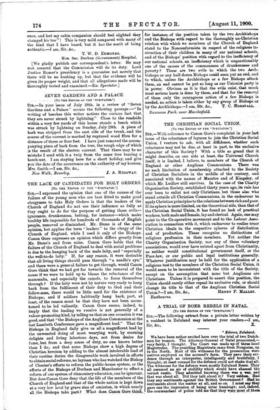THE LACK OF CANDIDATES FOR HOLY ORDERS.
[TO THE EDITOR OP THE "SPECTATOR."]
SIR,—I expressed the opinion that one of the causes of the failure of the young men who are best fitted to make good clergymen to take Holy Orders is that the leaders of the Church of England do not use their influence as fully as they ought to do for the purpose of getting those evils— ignorance, drunkenness, betting, for instance—which make healthy life impossible for hundreds of thousands of English people, removed or diminished. Mr. Stone is of the same opinion, but applies the term "leaders" to the clergy of the Church of England, while I used it only of the Bishops. Canon Gore expresses an opinion which differs greatly from Mr. Stone's and from mine. Canon Gore holds that the failure of the Church of England to deal with social problems is due to the hanging back of the male laity, and "especially the well-to-do laity." If, for any reason, it were desirable that all living things should pass through "a needle's eye," and there were a general failure to get through, would Canon Gore think that we had got far towards the removal of the cause if we were to hold up to blame the reluctance of the mammalia, and especially the camels, to force themselves through ? If the laity were not by nature very ready to hang back from the fulfilment of their duty to God and their fellow-men, there would be little need for the existence of Bishops; and if soldiers habitually hang back, part, at least, of the reason must be that they have not been accus- tomed to be led valiantly. Canon Gore seems, indeed, to imply that the leading we receive is not generally of a valour-promoting kind, by telling us that on one occasion it was good, and that "the Bishops of the Anglican Communion at the last Lambeth Conference gave a magnificent lead." That the Bishops in England daily give us all a magnificent lead by the unwearied doing of most wearying work, by scorning delights and living laborious days, not from desire for fame, but from a deep sense of duty, no one knows better than I do; and that some Bishops show a high degree of Christian heroism by adding to the almost intolerable load of their routine duties the disagreeable work involved in efforts to obtain social reforms, no layman who has watched the Bishop of Chester's efforts to reform the public-house system, or the efforts of the Bishops of Durham and Manchester to effect a reform of our system of elementary education, can be ignorant. But does Canon Gore deny that the life of the members of the Church of England and that of the whole nation is kept down at a very low level by grave sins of omission, in which nearly ill the Bishops take part? What does .Canon Gore thinfr, for instance, of the position taken by the two Archbishops and the Bishops with regard to the thoroughly im-Christian relation with which we members a the Church of England stand to the Nonconformists in respect of the religious in- struction of their children in many of our national schools, and of the Bishops' position with regard to the inefficiency of our national schools, an inefficiency which is unquestionably one of the causes of the commonness of drunkenness and poverty? These are two evils to which the two Arch- bishops or any half-dozen Bishops could soon put an end, and to which, unless the Archbishops or a few Bishops attack them, an end cannot be put so long as our Unionist party is in power. Obvious as it is that the evils exist, that much most serious harm is done by them, and that for the removal of them only the courageous action of a few Bishops is needed, no action is taken either by any group of Bishops or by the Archbishops.—I am, Sir, &c., T. C. ROBSFALL.
Swanscoe Park, near Macclesfield.


































 Previous page
Previous page